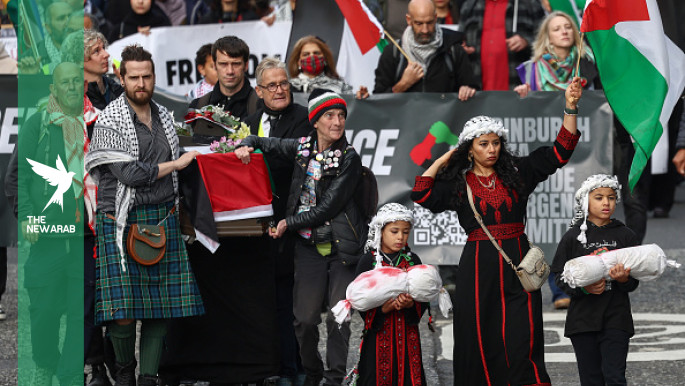The march is set to attract thousands and could test UK laws proscribing Palestine Action [Getty]
Thousands of people are expected to march through Edinburgh this weekend in a national demonstration against the war in Gaza, demanding an end to UK arms sales to Israel and greater action by the Scottish Government.
The protest, organised by Stop the War Scotland and supported by the STUC, Scottish CND, Edinburgh TUC, PCS union, and other groups, will set off from The Mound at 2pm on 6 September, before heading to a rally at Queen Elizabeth House, the UK Government’s headquarters in Edinburgh.
Organisers say the march will be one of the largest in Scotland since Israel’s latest assault on Gaza, bringing together trade unions, peace campaigners, and solidarity organisations. Activists from Defend Our Juries will also take part, promising “peaceful and courageous action” in defiance of what they call Westminster’s criminalisation of non-violent direct action.
Sophie Johnson, Secretary of Stop the War Scotland, told The New Arab that the demonstration comes at a critical moment for what activists can achieve when it comes to Gaza.
“Now is the moment for the movement to push harder, to strike while the iron is hot, and to demand all arms sales to Israel be stopped immediately,” she said.
Crackdown on protest
The march follows a series of arrests in Scotland linked to Palestine solidarity activism, including the award-winning screenwriter Paul Laverty, who was charged for wearing an “illegal” T-shirt at a previous demonstration. Several activists were detained after wearing shirts reading “genocide in Palestine, time to take action.”
Campaigners accuse the UK Government of trying to divide the movement by proscribing the pro-Gaza direct action group Palestine Action as a terrorist organisation, and cracking down on protest. A spokesperson for Defend Our Juries said: “The UK Government should have ended arms exports to Israel years ago… Since they failed disgracefully, it was left to citizens to take matters into their own hands.”
Johnson linked the clampdown to the scale of opposition.
“For nearly two years, we have witnessed attempts to ban marches, the imposition of heavy restriction orders on demonstrations, arrests over placards, raids on journalists’ homes, efforts to curtail the cultural sphere, and now the proscription of a non-violent direct action group,” she said.
“This ban is part of an attempt to divide the movement… We reject this division.”
Pressure on Holyrood
Organisers argue the Scottish Government can do more with its devolved powers. First Minister John Swinney has described Israel’s assault as genocide and called for UK sanctions, but Stop the War Scotland is pressing for full boycott measures.
“The Scottish Government too has failed to use the levers available to it to oppose Israel’s genocide. That is why we are demanding a full Scottish Government boycott. That means no more contracts with Israeli companies, breaking cultural ties, ending diplomatic relations, and above all, no more public money to arms factories via Scottish Enterprise,” Johnson told TNA.
“It is simple: arms manufacturers are supplying the weaponry used to commit one of the most abhorrent crimes in modern history – stop funding them now.”
Campaigners argue that policing, procurement, and economic development are devolved areas in which Holyrood can apply sanctions. Several MSPs have already signalled support for boycott measures.
International incentives
Organisers point out that Scotland would not be acting alone.
“Italy, Japan, Spain, Canada, Colombia, the Netherlands, and Belgium have all ceased arming Israel,” Johnson noted.
“Others, including South Africa, have cut all ties. Pressure is essential from every corner of the movement, but it must be strongest from those in countries whose governments are facilitating the massacre.”
A test for democracy
Saturday’s protest will coincide with similar actions in London, with organisers framing the day as a test for Scottish democracy. Policing is devolved, and campaigners argue that arrests in Scotland risk breaching international human rights. The Scottish Human Rights Commission, Amnesty International, and former First Minister Humza Yousaf have all warned against continued prosecutions of peaceful protesters.
Johnson said the demonstration will make that point clear.
“The demonstration on Saturday is a huge test for our democracy. Many activists will take action in defiance of the ban, while many more will stand alongside them in solidarity. Will Police Scotland and the Scottish Government uphold the right to peaceful protest against war crimes?”


